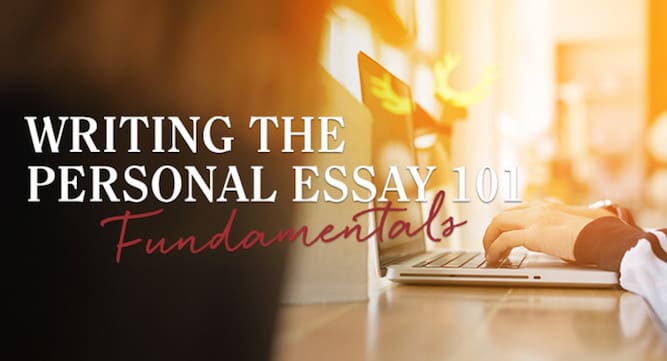How to Write Compelling Personal Essays: 9 Ingredients for Spicing Up Your Writing
“What’s so special about you?” It sounds like a playground taunt. But if you want to write personal essays, it’s the most important question you can ask yourself. When you describe some special moment in your life, no matter how small, it should resonate with others, and in doing so, move them. That’s the writer’s payoff, and the reason most of us spend so many hours at our keyboards.
(What Is a Personal Reportage Essay in Writing?)
Every day, in person, we tell our stories to friends and co-workers in part to get a reaction from them. Like trying to recreate the recipe for a favorite dish, the trick is to get our stories down on paper in a way that captures the same kind of emotion we exude when we’re sharing them face-to-face.
Essay writing is popular because we’re used to writing about ourselves in some fashion, whether it’s in a journal, a blog, or in elaborate emails about our weekend activities. You can take those starter pieces and add a few extra ingredients, like a stunning opening line and a quirky ending, and you’re on your way to writing a powerful personal narrative.
But don’t stop working on your piece too soon. Once you get the basic story down, it’s important to keep working on it until it’s “off the hook,” as Food Network star Guy Fieri says. Here are nine ways to infuse your essays with more flavor:
1. Write from personal experience.
Each of us has a life as unique as my Aunt Jane’s sugar cookies. You are the only one who has experienced a particular event in that moment, in that particular way, in that place or time, with those people, so you’re the only one who can tell that story. Sift through your life memories for material worth writing about.
2. Offer an original idea or different perspective.
As readers, we all crave new information and new experiences. When asked about how to submit effective queries, editors will often say, “Tell me something I don’t know.” You don’t have to be a genius or be world-traveled in order to write something original. Just observe the world around you carefully and pay attention when you’re having thoughts that reflect an unusual twist or take on a topic.
3. Tap into universal themes and feelings.
Powerful essays resonate with the reader; they ring true. They can also validate what you feel or believe. You don’t have to write about a large theme—you can write about a single moment in time—and still greatly affect someone. When they’re reading your words, you want your audience to nod in agreement, get the chills, or laugh until their stomachs hurt.
4. Use vivid descriptions.
Try to create a visual image in your reader’s mind. Describe what you see, hear, smell, taste, and touch so your readers can experience it along with you. Let’s say you take your daughter to the State Fair for the first time. Does she have chocolate ice cream dribbling down her chin? Is her hair scrambled from the rides? Is she singing in the car on the ride home? Write it so that even someone who’s never been to a fair will know just what it’s like.
5. Tune into your own emotions.
Does your blood pressure rise when you’re watching a fight? Do you cry when your sister cries? Human beings are wired such that when one person experiences a strong emotion, others are touched as well. As writers, when we’re authentic, others react. Dig deep to remember the exact feeling you had at the time of the event you’re writing about and develop an emotional vocabulary beyond the simple “mad, sad, and glad” terms we used as children.
6. Use a tone that reflects your message.
A tone can be affectionate, sarcastic, playful, or self-deprecating. Don’t exaggerate the tone, unless it’s for humorous effect, and then make sure it’s obvious. You don’t want to risk alienating your readers by being overly political, preachy, crude, gross, or intolerant. How far you can go will depend upon your own comfort level, your intended audience, and the publication you’re targeting.
7. Develop a unique voice.
Just like our speaking voices, our writing voices are unique. Sentence structure, cadence, and word choices all impact the way we sound. Clichés are as boring as meatloaf because we’ve experienced them too often. Unique voices are created by saying something in a startling new way. Think about the way whimsical screenwriter Adrienne Shelly made us laugh at the unusual names (“bad baby pie”) she gave her pies in the movie The Waitress.
8. Be succinct.
As we know from speakers who drone on and on, sometimes the most profound way to say something is to use as few words as possible. Say what you mean and don’t veer off track. It’s okay to write your way into a story—it can help get the juices flowing—but you have to be willing to delete the off-topic chatter during the editing process.
9. Start and end strong.
The first bite is the most important. Start with an unusual hook to grab your readers right away, and don’t fade out at the end. Whether you finish your piece with an inspiring thought, a joke, or a surprise, be intentional about your ending. You know that “Wow!” feeling you get at the end of a great movie, the one that causes the audience to spontaneously break into applause? That’s what you’re aiming for.
Each of us has the ability to inspire, amuse, and amaze others. Take some time to figure out “what’s so special about you,” and start writing about it. Then use these nine ingredients to spice up your writing.

This course guides beginning and intermediate writers through elements of how to write a personal essay, helping them identify values expressed in their stories and bring readers into the experiences described. Writers learn how to avoid the dreaded responses of “so what?” and “I guess you had to be there” by utilizing sensory details, learning to trust their writing intuitions, and developing a skilled internal editor to help with revision.


